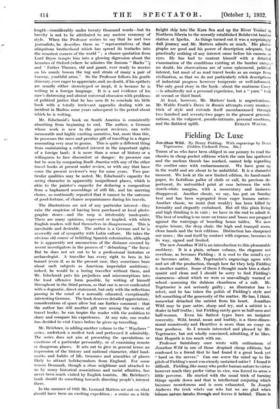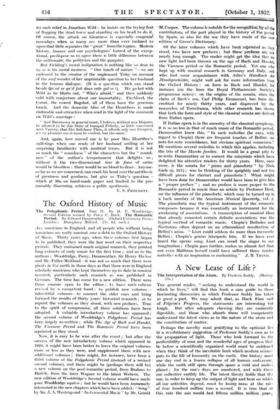Fielding De Luxe
Jonathan Wild. By Henry Fielding. With engravings by Danis Tegetmeier. (Golden Cockerell Press. 30s.)
THOSE of us who have been obliged in our penury to read the classics in cheap pocket editions which the rain has spattered and the unclean thumb has marked, cannot help regarding the costlier ones with embarrassment. We have gone up in the world and are about to be unfaithful. It is a shameful moment. We look at the new limited edition, its hand-made paper, its fastidious pallor of cloth or calf, its precious de- portment, its untroubled print at ease between the wide starch-white margins, with a momentary and insincere disapproval. Another classic, we say, has put on Sunday best and has been segregated from eager human nature. Another classic, we insist (but weakly) has been killed by formality and elegantly embalmed. But all this plain living and high thinking is in vain ; we have in the end to admit it. The best of reading is no more on trams and 'buses nor propped against the waterjugs of boarding house tables. We now require leisure, the deep chair, the high and tranquil room, clean hands and the best editions. Distinction has sharpened our noses ; the soul itself by contact with expense, becomes in its way, signed and limited.
The new Jonathan Wild is an introduction to this pleasurable snobbery. It is a plain, urbane volume, the elegance not overdone, as becomes Fielding ; it is cool to the mind's eye as becomes satire. Mr. Tegetmeier's engravings agree with and set off the production, though how far they help Fielding is another matter. Some of them I thought made him a shade quaint and clean and I should be sorry to find Fielding's coarseness—about which we were so unavailingly warned at school—assuming the dubious cleanliness of a cult. Mr. Tegetmeier is not seriously guilty ; an illustrator has to select, and he has taken the polish of Fielding's style and left something of the generosity of the matter. He has, I think, somewhat detached the satirist from his heart. Jonathan Wild may be pure satire, sharp and icy, and a satirist is a dealer in half truths ; but Fielding rarely gave us half-men and half-women. Even his flattest types have an incipient convexity. Wild, brutal, mean and loathly, is a three-dimen- sional monstrosity and Heartfree is more than an essay on true goodness. So I remain interested and pleased by Mr. Tegetmeier, but not wholly convinced, admitting, if he likes, that Hogarth is too much with me.
-Professor Saintsbury once wrote with enthusiasm of JOitathan Wild in one of those despised cheap editions, but confessed to a friend that he had found it a great book yet
hard on the- nerves." Can one screw the mind up to the pitch of Fielding's most consciously sustained satire ? I found it difficult. Fielding, like many who prefer human nature to virtue however much they prefer virtue to vice, was forced to seem a little perverse. He started with the usual trick of turning things upside down and that is intellectual conjuring which becomes monotonous and is soon exhausted. In Joseph Andrews the trick whets our wits but we are glad when hiiinan.,naktgreAreaks threngb-end leaves it behind:: them is
ho such relief its Jonathan Wild : -he insists on the trying-feist' of flogging the dead horse and standing on his head to do it. Of course, the attack on Greatness is especially congenial nowadays when so many are more than ever inclined to agree that little separates the " great " from the rogues. Modern history, finance and our psychologists' hatred of the excep- tional, predispose us to agree there is little difference between the millionaite, the politician and the gangster.
But Fielding's moral indignation is nothing like so dear to us as is his moral easiness. " One touch of nature are endeared to the creator of the unpleasant Tishy on account of the nail wonder of her unprintable question to her husband in the famous dialogue. (It is a question which can stand beside Qu'est ce qu'il fait dans cette gaiAre?). We go hot with Wild as he blurts out, " Who's afraid," and then suddenly cold with conjecture about' our immortality. Fireblood, the Count, the cowed Bagshot, all of them have the generous touch. And the domestic bliss of the Heartfrees is made :endurable and attractive when read in the light of the comment on Wild's marriage :
" And Matrimony in general must, I believe, without any Dispute, be allowed to be this State of tranquil Felicity, so little concerned ,with Variety, that like Salisbury Plain, it affords only one Prospect, a very pleasant one it must be confest, but the same."
And, again, how moved one is by poor Mrs. Heartfree's sufferings when one reads of her husband smiling at her surprising familiarity with nautical terms. But it is not so much the " roundness " of the characters but the " round- ness " of the . author's temperament . that delights us without it the two-dimensional tour de force of satire would be bloodless : there would be no blood to draw. Anyone,
so far as we are concerned, can crack his head over the antithesis of' greatness and goodness, but give us Tishy's question—
which at 30s. on hand-made paper and limited to the pre- sumably- discerning, achieves a polite apotheosis.
V. S. PRITCHETT.















































 Previous page
Previous page